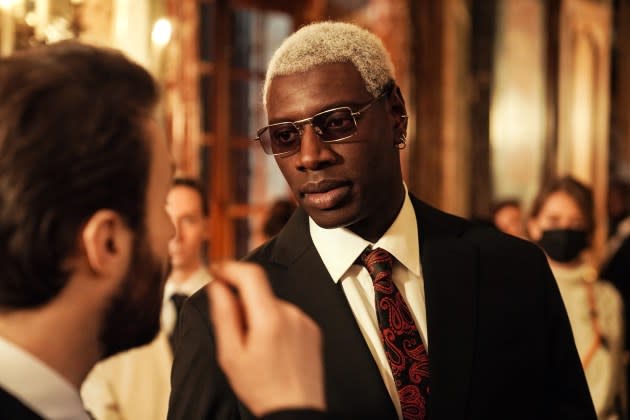‘Lupin’ Part Three Doesn’t Give Omar Sy Nearly Enough Help
- Oops!Something went wrong.Please try again later.
- Oops!Something went wrong.Please try again later.

Early in the new season of Netflix’s Lupin, a pair of reporters argue about the best way to cover the continuing saga of Assane Diop, the master thief who has become a celebrity and cult hero in their native France. As the writers consider Assane’s story so far — depicted in the wildly popular run of episodes that debuted back in 2021 — one of them suggests that after so many wild twists and turns, “There’s nothing left to say.”
It will not shock you at all to learn that the reporters do, indeed, find new things to say about Assane. The writers of Lupin, on the other hand, find this a bit more challenging. The series remains entertaining, thanks to the wild charisma of Omar Sy as Assane, and to the cleverness of many of the heists. But like the second batch of episodes from 2021, much of it feels repetitive of the initial five episodes, and less thrilling.
More from Rolling Stone
David and Victoria Beckham Break Silence on Affair Allegations in Documentary
Why Tupac's Alleged Killer Could Be Caught in a Legal 'Catch-22'
A Rare Thread of Humanity Cuts Through Chaos and War in 'All the Light We Cannot See' Trailer
We pick up with Assane hiding from the law after his identity was revealed at the end of last season. As always, there’s a good deal of humor, intended or not(*), in the idea of a man this handsome, and this large, being able to move around unnoticed, sometimes with minor disguises, sometimes with none at all. (In one scene, a bank employee recognizes him when he’s undisguised, and he pretends to be an Assane lookalike whose life is constantly being disrupted by people mistaking him for a notorious fugitive.) He tries to persuade ex-wife Claire (Ludivine Sagnier) to take their son Raoul (Etan Simon) and run away with him, but she’s too frustrated by the impact his criming has had on their lives. Police investigator Youssef Guedira (Soufiane Guerrab) has become obsessed with the books about master thief Arsene Lupin, which inspire Assane’s heists, but his colleagues are wary of him. And in recurring flashbacks, we see how the teenage Assane (Mamadou Haidara) started to get seriously into thieving after his father went to prison. And Assane gets blackmailed by a mystery opponent into stealing priceless trinkets on their behalf.
(*) At one point, Assane argues that being a Black man in his 40s renders him functionally invisible. Whether or not you agree with the larger point, most Black men in their 40s do not resemble Omar Sy.
Assane not being master of his own fate is easily the biggest change from prior editions. There’s a satisfying level of tension from him having to dance to someone else’s tune. At the same time, he is left to his own devices about how to steal these things, with the help of trusted gadgeteer sidekick Benjamin (Antoine Gouy). Lupin once again takes great pleasure in presenting the heists and only then letting us see how its hero has pulled off his latest trick. Some of these are more ridiculous than others — in particular, a stunt where Assane tells police exactly when and where he will strike next, along with its aftermath — but the energy of them and Sy’s screen presence makes them work.
The problem is more about the world around Assane. Claire, Raoul, the cops, and even teenage Assane were all interesting in their own right back when the series began. At this stage, though, scenes with the larger ensemble often feel obligatory, either to set up later plot points, or simply to avoid overworking Sy(*). There’s a particularly silly subplot that involves Benjamin making Assane a disguise worthy of Mission: Impossible so that he can spend time with Claire and Raoul without them knowing who he is(**). It’s simultaneously a relief and a worry that every scene not featuring Assane features other characters talking about him, as it speaks to how important and memorable he is, but also illustrates that nobody else is remotely as interesting.
(*) In the TV criticism game, we call this The Dexter Problem, after a show that in its early seasons was great when Michael C. Hall was onscreen, and terrible whenever the focus turned to everyone else at Miami Metro so that Hall could catch his breath.
(**) This storyline makes another convincing argument for why you should watch the subtitled French version rather than the dubbed English one. Part of the disguise is an electronic voice changer on the throat (again, indebted to Ethan Hunt and friends). In the subtitled version, Assane sounds very different as this alter ego, while there’s no discernible vocal change in the dub.
The season ends with a status quo change even more significant than Assane’s secret identity being exposed to the world. Ensuing seasons might have fun with its hero’s changed circumstances, or may move quickly to reset things to normal. The good news is that, so long as Sy is around, there’s a baseline level of quality for Lupin, even if it doesn’t feel as fresh or satisfying all-around as it did a few years ago.
The new Lupin season is streaming now on Netflix. I’ve seen all seven episodes.
Best of Rolling Stone
